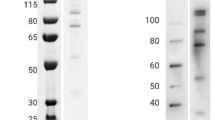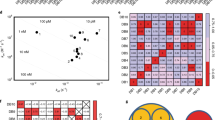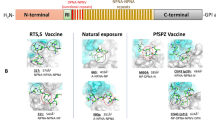Abstract
Malaria is increasing in incidence and prevalence in most tropical areas and is a major problem for both individuals and communities1. Current malaria research is aimed at developing vaccines2–4 and, for this, it may be useful to define Plasmodium antigen(s) related to the development of a protective immune response in the host. Monoclonal antibodies have recently been shown to interfere with rodent malaria infection (Plasmodium berghei) at the sporozoite5 or merozoite6 stage. We have now raised monoclonal antibodies againstsingle antigenic determinant(s) of Plasmodium falciparum and report that some of them inhibit the growth of erythrocytic forms of P. falciparum in vitro.
This is a preview of subscription content, access via your institution
Access options
Subscribe to this journal
Receive 51 print issues and online access
$199.00 per year
only $3.90 per issue
Buy this article
- Purchase on Springer Link
- Instant access to full article PDF
Prices may be subject to local taxes which are calculated during checkout
Similar content being viewed by others
References
3rd Annual Report on Special Program for Research and Training in Tropical Diseases (WHO, Geneva, 1979).
Cohen, S., Butcher, G. A. & Mitchell, G. H. Adv. exp. Med. Biol. 93, 89–112 (1977).
Reese, R. T., Trager, W., Jensen, J. B., Miller, D. A. & Tantravaki, R. Proc. natn. Acad. Sci. U.S.A. 75, 5665–5669 (1978).
Siddiqui, W. A. Science 197, 388–389 (1977).
Yoshida, N., Nussenzweig, R. S., Potocnjak, P., Nussenzweig, V. & Aikawa, M. Science 207, 71–73 (1980).
Freeman, R. R., Trejdosiewicz, A. J. & Cross, G. A. M. Nature 284, 366–368 (1980).
Trager, W. & Jensen, J. B. Nature 273, 621–622 (1978); Science 193, 673–675 (1976).
Lambros, C. & Vanderberg, J. P. J. Parasit. 65, 418–420 (1979).
Reese, R. T., Langreth, S. G. & Trager, W. Bull. Wld Hlth Org. Suppl. 1, 53–62 (1979).
June, C. H., Contreras, C. E., Perrin, L. H., Lambert, P. H. & Mischer, P. A. J. Immun. 121, 2154–2160 (1979).
Galfre, G., Hove, S. C. & Milstein, C. Nature 266, 550–552 (1977).
O'Neill, P. & Johnson, G. D. J. clin. Path. 23, 185–189 (1970).
Wilson, R. J. M. & Phillips, R. S. Nature 263, 132–134 (1976).
Perrin, L. H., Ramirez, E., Liu, E.-H. & Lambert, P. H. Clin. exp. Immun. 41, 91–96 (1980).
Cohen, S., McGregor, I. A. & Carrington, S. P. Nature 192, 733–737 (1961).
Phillips, R. S., Trigg, P. I., Scott-Finnigan, T. J. & Bartholomew, R. K. Parasitology 65, 525 (1972).
Broome, S. & Gilbert, W. Proc. natn. Acad. Sci. U.S.A. 75, 2746–2749 (1978).
Author information
Authors and Affiliations
Rights and permissions
About this article
Cite this article
Perrin, L., Ramirez, E., Lambert, P. et al. Inhibition of P. falciparum growth in human erythrocytes by monoclonal antibodies. Nature 289, 301–303 (1981). https://doi.org/10.1038/289301a0
Received:
Accepted:
Issue Date:
DOI: https://doi.org/10.1038/289301a0
This article is cited by
-
Antibodies against Plasmodium falciparum malaria at the molecular level
Nature Reviews Immunology (2019)
-
Inhibitory monoclonal antibodies to soluble Plasmodium falciparum antigens
Parasitology Research (1987)
-
Molecular Genetic Strategies for the Development of Anti-Malarial Vaccines
Bio/Technology (1985)
-
Immunoelectrophoretic analysis of erythrocytic stages ofPlasmodium yoelii andP. chabaudi
Zeitschrift f�r Parasitenkunde Parasitology Research (1984)
Comments
By submitting a comment you agree to abide by our Terms and Community Guidelines. If you find something abusive or that does not comply with our terms or guidelines please flag it as inappropriate.



